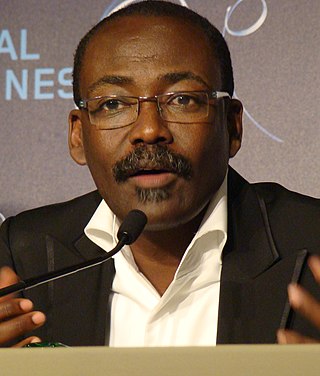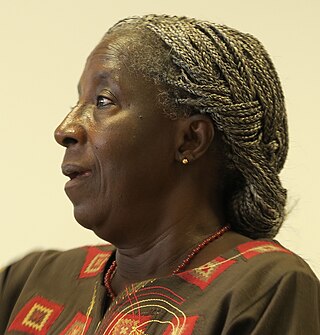
Gitega, formerly Kitega, is the political capital of Burundi. Located in the centre of the country, in the Burundian central plateau roughly 62 kilometres (39 mi) east of Bujumbura, the largest city and former political capital, Gitega is also the second largest city and former royal capital of the Kingdom of Burundi until its abolition in 1966. In late December 2018, Burundian president Pierre Nkurunziza announced that he would follow on a 2007 promise to return Gitega its former political capital status, with Bujumbura remaining as economic capital and centre of commerce. A vote in the Parliament of Burundi made the change official on 16 January 2019, with all branches of government expected to move in over three years.

Boubacar Diallo Telli was a Guinean diplomat and politician. He helped found the Organisation of African Unity (OAU) and was the second secretary-general of the OAU between 1964 and 1972. After serving as Minister of Justice in Guinea for four years he was executed by starvation by the regime of Ahmed Sékou Touré at Camp Boiro in 1977.

Radio France Internationale, usually referred to as RFI, is the state-owned international radio news network of France. With 37.2 million listeners in 2014, it is one of the most-listened-to international radio stations in the world, along with Deutsche Welle, the BBC World Service, the Voice of America, Radio Netherlands Worldwide, and China Radio International.
The Paris Evangelical Missionary Society, also known as the SMEP or Mission de Paris, was a Protestant missionary association created in 1822. As with other Christian societies of the era, it came under of the auspices of an organised church, in this case the Reformed Church in France and brought together Protestants of the Réveil (Awakening).

The Cinema of Chad is small though growing. The first film made in the country appears to have been 1958 John Huston adventure film The Roots of Heaven, filmed when the country was still a part of French Equatorial Africa. Documentary filmmaker Edouard Sailly made a series of shorts in the 1960s depicting daily life in the country. During this period there were a number of cinemas in the country, including in N'Djamena Le Normandie, Le Vogue, the Rio, the Étoile and the Shéherazade, and also the Rex in Sarh, the Logone in Moundou and the Ciné Chachati in Abéché. The film industry suffered severely in the 1970s-80s as Chad became engulfed in a series of civil wars and foreign military interventions; film production stopped, and all the cinemas in Chad closed down. Following the ousting of dictator Hissène Habré by Idriss Déby in 1990 the situation in the country stabilised somewhat, allowing the development of a nascent film industry, most notably with the work of directors Mahamat-Saleh Haroun, Issa Serge Coelo and Abakar Chene Massar. Mahamat-Saleh Haroun has won awards at the Panafrican Film and Television Festival of Ouagadougou, Venice International Film Festival and the Cannes Film Festival. In January 2011 Le Normandie in N'Djamena, said to now be the only cinema in Chad, re-opened with government support.

Kilien Stengel is a French gastronomic author, restaurateur, and cookbook writer. He has worked at Gidleigh Park, Nikko Hotels, Georges V Hotel in Paris, and in a number of Relais & Châteaux restaurants.
Camp Boiro or Camp Mamadou Boiro (1960–1984) is a defunct Guinean concentration camp within Conakry city. During the regime of President Ahmed Sékou Touré, thousands of political opponents were imprisoned at the camp. It has been estimated that almost 5,000 people were executed or died from torture or starvation at the camp. According to other estimates, the number of victims was ten times higher: 50,000.
Raphaël Millet is a French writer, critic, producer and director of cinema and television, as well as an organiser and programmer of photographic and cultural events.
Alpha Oumar Barry (1925–1977) was a Guinean politician, a member of the cabinet of President Ahmed Sékou Touré in the first Guinean republic, who was later arrested and died at Camp Boiro.

Patrice Yengo is a francophone Congolese political anthropologist living and teaching in Paris, France. He is a specialist of the Congolese Civil War (1993–2002), otherwise known as the Republic of the Congo Civil War. He is originally from Pointe-Noire, Republic of the Congo (Congo-Brazzaville).
Joseph Tonda is a sociologist and anthropologist of Congolese and Gabonese background. He is a specialist of Congolese and Gabonese culture, society, and politics, and is currently professor of sociology at Omar Bongo University in Libreville. He is also a regular visiting instructor at the École des Hautes Études en Sciences Sociales (EHESS) in Paris, France.
Father Henry Gravrand was a French Catholic missionary to Africa and an anthropologist who has written extensively on Serer religion and culture. He was one of the leading pioneers of interfaith dialog and believed that African religion was the "'first covenant between God and man". His works about the Serer people are cited by other historians and scholars writing on Serer history, religion and culture, for instance Martin A. Klein, Charles Becker, Alioune Sarr, Marguerite Dupire, Issa Laye Thiaw, etc. Papa Massène Sene argues that his approach lacks scientific rigor and include fundamental linguistic and historical errors. Alioune Sarr noted that Gravrand reported an oral tradition describing what he called the "Battle of Troubang", a dynastic war between the two maternal royal houses of Ñaanco and the Guelowar, an off-shot and relatives of the Ñaanco maternal dynasty of Kaabu, in modern-day Guinea Bissau. According to Charles Becker, Gravrand is confusing a description of the 1867 Battle of Kansala.

Matata Ponyo Mapon is a Congolese political figure who was Prime Minister of the Democratic Republic of the Congo from 18 April 2012 to 17 November 2016. Previously he served as Minister of Finance from 21 February 2010 to 12 April 2012; as Prime Minister, he retained responsibility for the finance portfolio. He currently serves as Senator for Maniema.

Africultures is a publication of arts and culture about and from Africa and its diasporas. Based in Paris, it was founded in 1997 under the impetus of Olivier Barlet by journalists and academics such as Virginie Andriamirado, Gérald Arnaud, Tanella Boni, Sylvie Chalaye, Christophe Cassiau-Haurie, Fayçal Chehat, Soeuf Elbadawi, Boniface Mongo-Mboussa, etc. The magazine is managed by the association Africultures and it is published by L'Harmattan. Since 2012 the documentation produced by the magazine and its database made of over 45,000 biographies of artists and 55,000 description of books, music, films and institutions has been released under the open Creative Commons attribution share alike license.

Éditions L'Harmattan, usually known simply as L'Harmattan, is one of the largest French book publishers. It specialises in non-fiction books with a particular focus on Sub-Saharan Africa. It is named after the Harmattan, a trade wind in West Africa.
Pierre Kipré is a historian and writer from Ivory Coast. He is a former student of the École normale supérieure in Abidjan.
Charles Monteil was a French civil servant who combined a career in the administration with studies in the ethnology, languages and history of French West Africa.

Fatou Sow is a Senegalese feminist sociologist specialising in sociology of gender.

Antoine Schneck is a French visual-art photographer born in 1963 in Suresnes, France.
Bogumil (Bogumił) Jewsiewicki Koss is a Polish-Canadian historian and an Africanist specialising in the history of Central Africa, notably the Democratic Republic of the Congo, and the social usage of visual memory.











